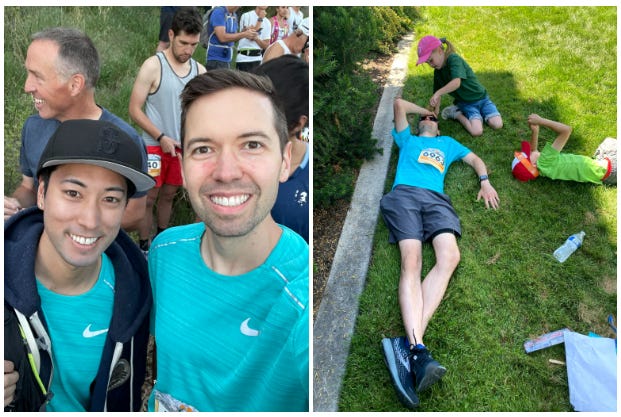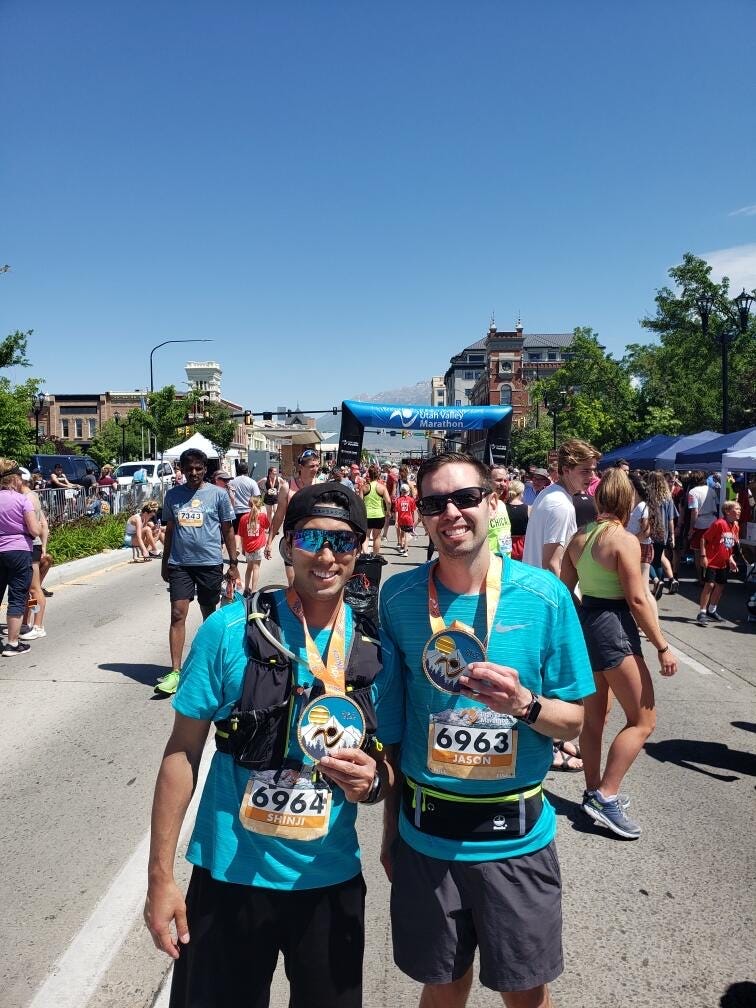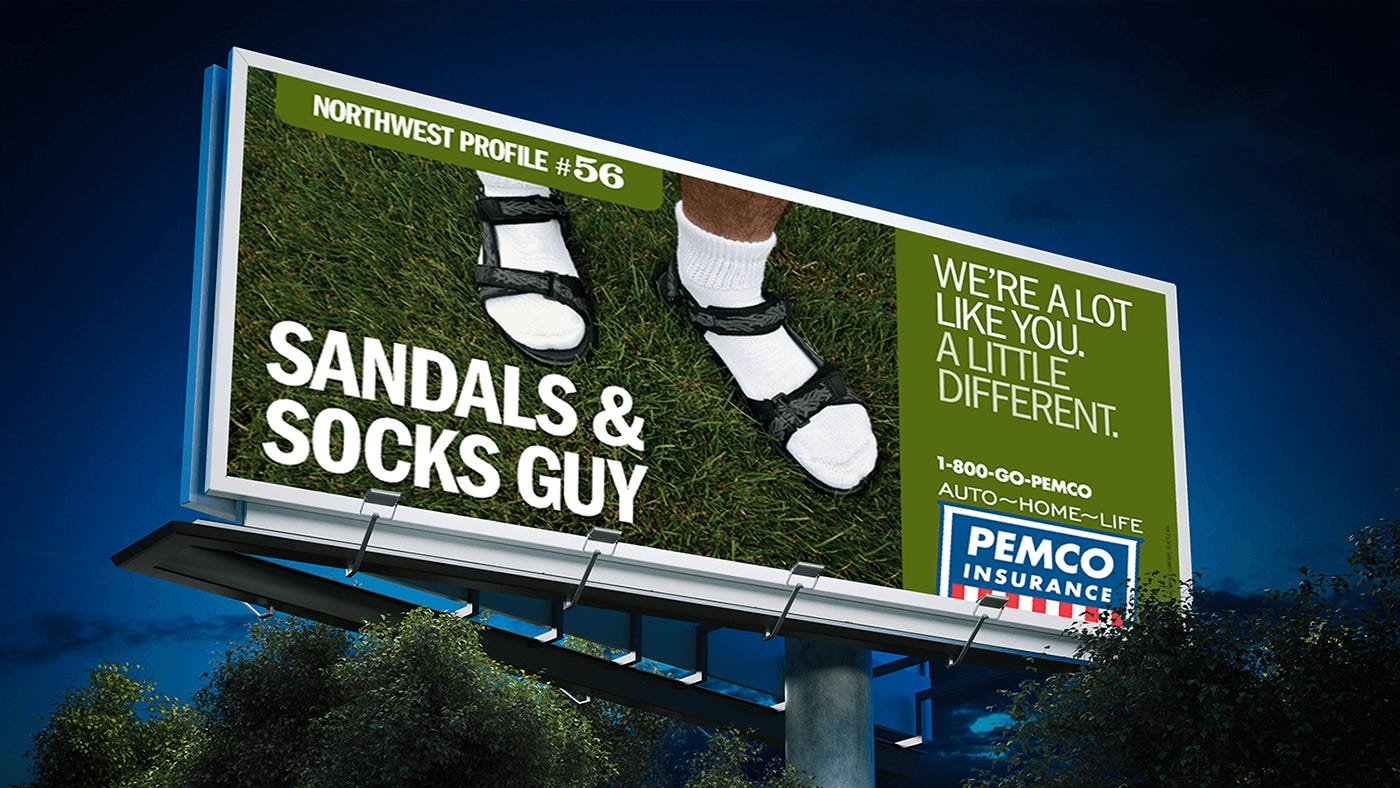Heat, Chafing, and Dry Heaving

Before and after Jason’s first marathon
As I dry heaved on a sidewalk full of spectators, with a missing toenail and my nipples bleeding, I knew things could have gone better. I was running my first marathon.
It was a scenic run to that point. We had run down the beautiful Provo Canyon in Utah. Views of a mountain stream, a waterfall, and the mountains filled my views. I was running with one of my best friends and the first couple of hours we were talking and laughing as we ran.
Then things started to fall apart.
First it was the heat. That day in May was the hottest recorded for that marathon. When we finished it was 90 degrees. I had done ALL of my training runs in the early mornings, often in snow or crisp Spring mornings. The heat of the actual marathon just zapped my body’s battery.
Secondly, I didn’t have any water. On my training runs I had carried water, but for some reason on the marathon I thought having the aid stations every two miles would provide enough water. They didn’t. When it gets hot (see above) you just need more water.
Third, I didn’t fuel properly. I now know that for distance running you need to eat about 300 calories per hour, with a balance of carbs and glucose. Your body can run about two hours without fuel, but in that third hour you’ll “bonk”, which is where your body runs out of fuel. It’s laughable now how little food I carried with me. I ate 2 little gels every 45 minutes. That’s about 1/4th of what you should eat. Seeing my lack of preparation my friend lent me some of his food, which did not agree with my stomach, and left me dry heaving around mile 22.
Fourth, with the heat, I had the genius idea to just dump some water on me. It felt great at the time. But a damp shirt rubbing against your skin over hours wreaks havoc. My shirt ended up being bloody from all the chaffing it caused . In hindsight I should have just taken my shirt off. Unfortunately I was too worried about spectators seeing a skinny yet hairy guy running through the streets.
Lastly, I should have just trained better. My longest run to that point was a leisurely 20 mile run, where a friend had ridden along with me on a bike. I should have trained like how I would be running the marathon. I would have learned all about heat, water, fuel, and chaffing well in advance as a result.
Despite all of my mistakes, I still finished that marathon and am proud of it. I have since ran 6 more marathons and two ultramarathons, and each one better than the last. At 37 years old I’m the most fit I have ever been.
There’s a lot of parallels you can draw from running into other areas of your life, and recently I’ve been reflecting on how much my disastrous first marathon was SO similar to my disastrous first career internship. Here are a few parallels that stood out to me:

A Disastrous First Internship

When I was a sophomore in college I landed a prestigious internship at PEMCO Insurance in Seattle. PEMCA was a fancy insurance company with clever ads and a swanky downtown office building. I was doing work for their foundation and loved the role, but obviously had not prepared properly. As I sat in my mid-point evaluation halfway through the internship, I remember being floored at how poorly I was doing.
First: Similar to not training in the heat for my marathon, I hadn’t ever been in an office setting. It was all new to me. I didn’t know who was senior management and who was entry level (all adults looked the same to me). I didn’t know proper office etiquette for scheduling meetings, writing a professional email, or how to do a 1:1 with my manager.
In hindsight everyone there was incredibly kind and patient with me. If you’re new in any role, my best advice is before the job starts to try to learn all you can, and when you start find a coworker willing to coach you on these things. Even in my latest job change I spent about 5 hours in my first week with Austin (my Unwritten co-author and new co-worker) asking culture questions about my new company. Essentially, you want to simulate the “marathon” with an experienced trainer as much as possible.
Second: I shouldn’t have assumed the water would be there. One of my projects was to select which organizations to donate money to. I worked with my boss to identify criteria and would interact with these organizations to see if there was a fit. In my mid-point review, some of the feedback I received was that I shouldn’t guarantee that they’ll get funding. I was an intern. There was a process for evaluation. I would meet with some organizations and just think/say “This is such a great fit! Of course they’ll get funded!”
Since then (and after years of working with vendors/partners) I NEVER guarantee anything. It’s kind of like when I was running my first marathon and I needed more water. My business is like the marathon organizers – they have water every 2 miles for the runners. It’s not their job to give out or promise more water than that. At some level businesses have constraints. I’ve dealt with anxious sales reps trying to meet their quarterly quota and feel terrible that I don’t have business for them. I feel for them – I’ve been without water too.
Third: I needed to ensure I had the right fuel (continual learning) in place. During the internship I did a great job learning about my role and even my department, but I did not understand the overall company at all. “Insurance is boring” I’m sure my 20-something mind was saying to itself every day. I could have learned the business, interacted more with other departments, and understood what drove the company’s foundational success. Instead I was too busy meeting with nonprofits and having coffee chats with people in my department. These were great activities but completely insufficient for actually developing understanding of the overall business. It’s kind of like when I ran my first marathon and I only brought a quarter of the fuel I needed to. To truly be successful I needed to better understand the company’s nutritional needs.
Fourth: I shouldn’t have been afraid to just execute the obvious solution (ex: take off my shirt) instead of “dumping water on myself”. I have a memory of a team offsite I was put on the committee for. We met a few times, I voiced some ideas, and then I basically just showed up and attended the offsite. In hindsight, I should have been way more helpful. I could have planned the whole thing and taken that off of my coworkers plates. They were all busy with their actual jobs and KPIs, and I was an intern where my literal job was to make their jobs easier. I should have taken on that project, but I think I was too worried about what people would think of me if I did.
Conclusion: How to Plan for Success in a New Role
In a new role (or experience) it’s okay to be vulnerable. More often with new hires my early feedback is them not understanding the business enough, which then led to a suboptimal outcome. I’d much rather have a new hire ask a million questions than zero questions. Just like running I’d rather have a newbie training for a marathon ask about the best tips/tricks to succeed rather than have to try and save their life on the race.
In running I have since asked a million questions to other runners, read dozens of running books, and my Instagram account is really more like a running app where I follow other runners.
I wish in my first internship I was more like this. Fortunately, I’m still proud of that initial internship experience. More importantly it taught me what I needed to change moving forward (even if my proverbial toenail was missing by the end…)


